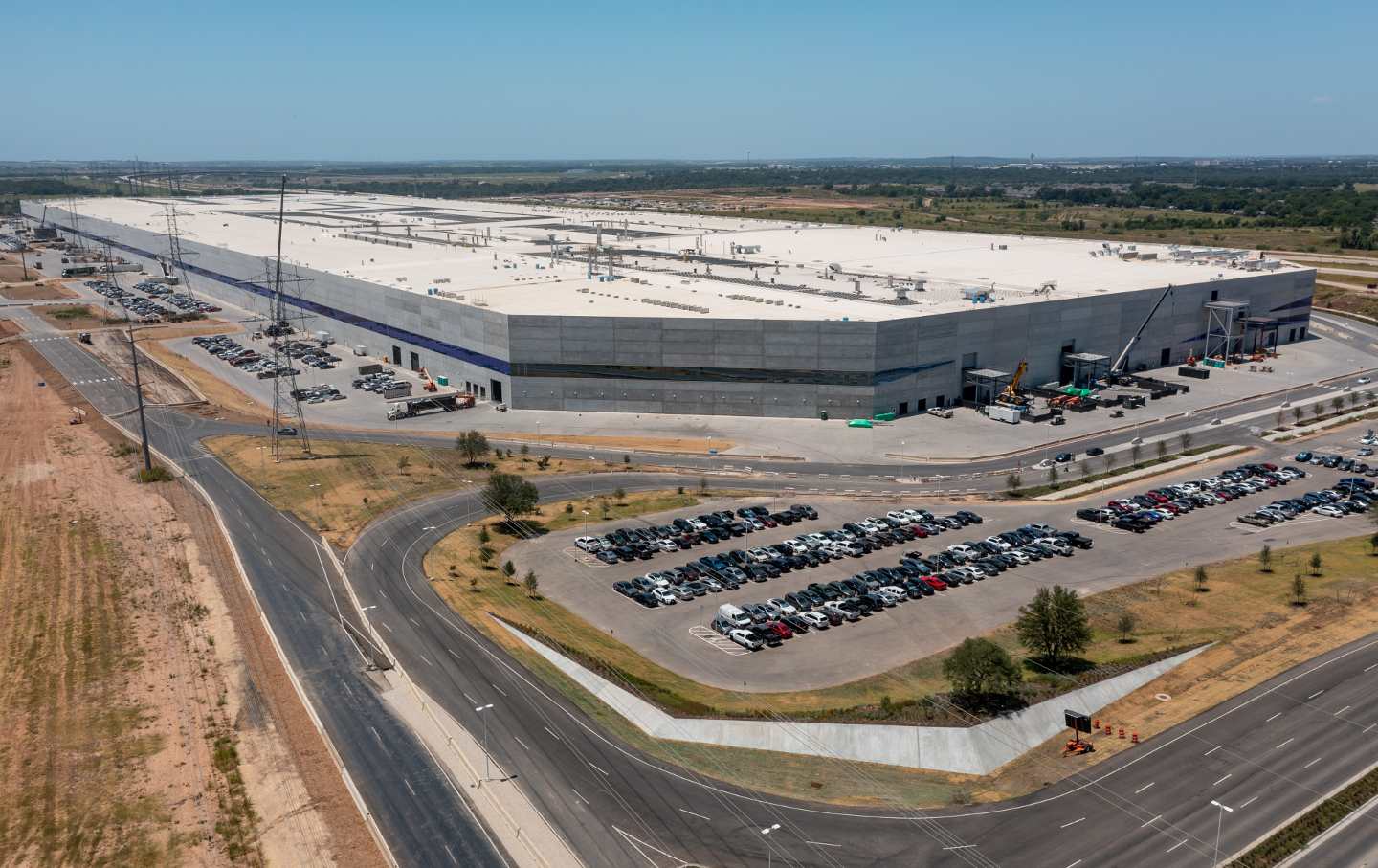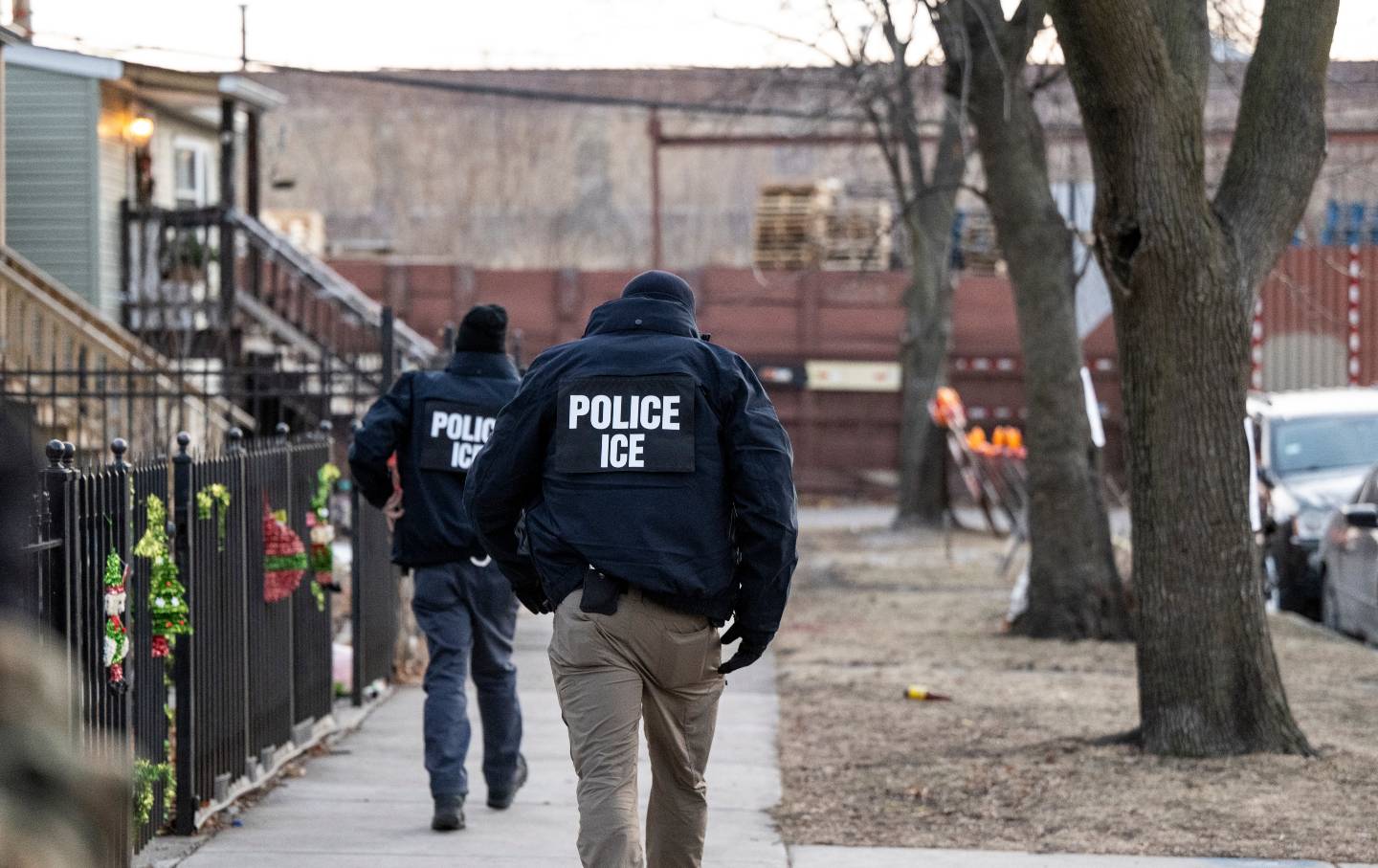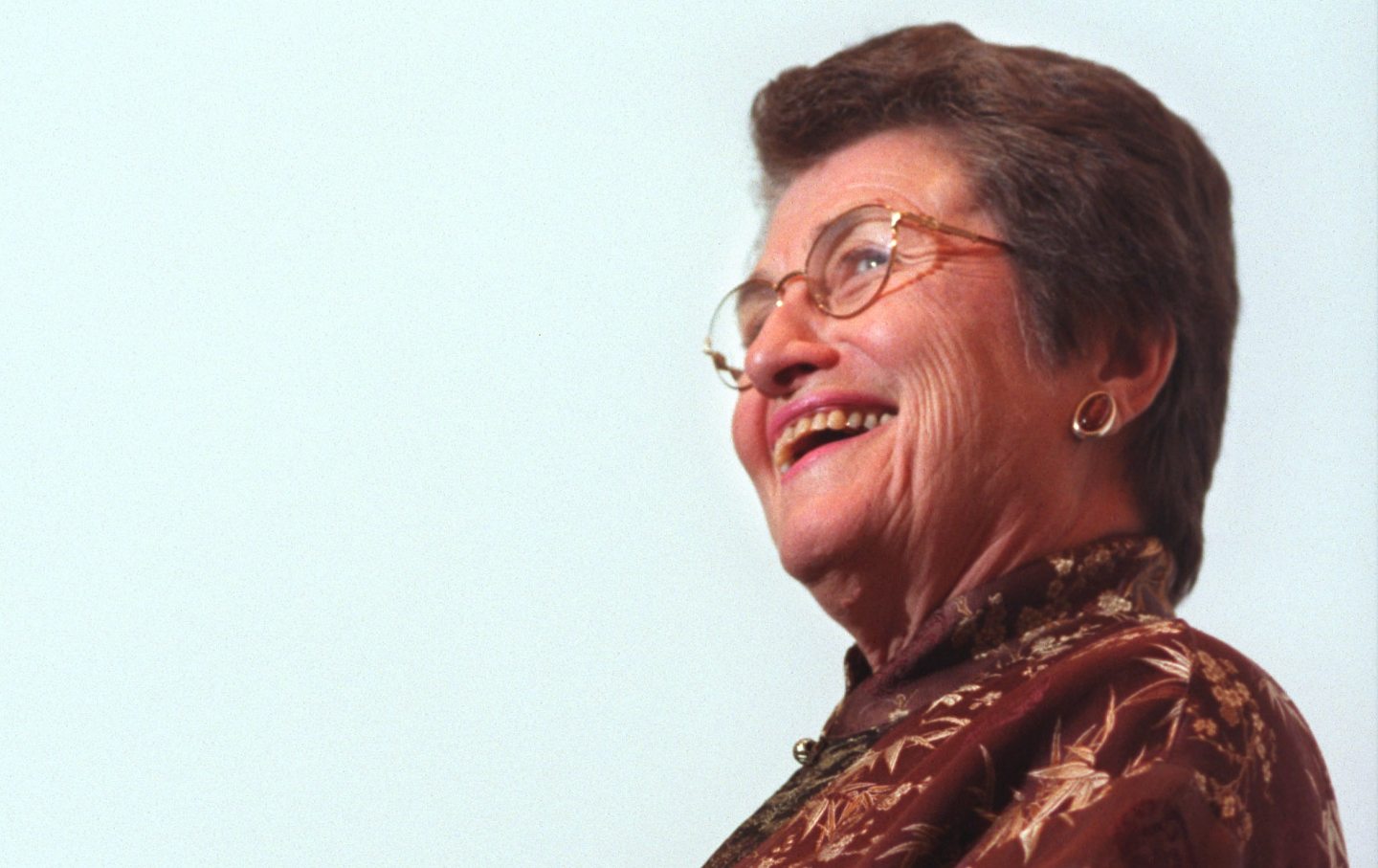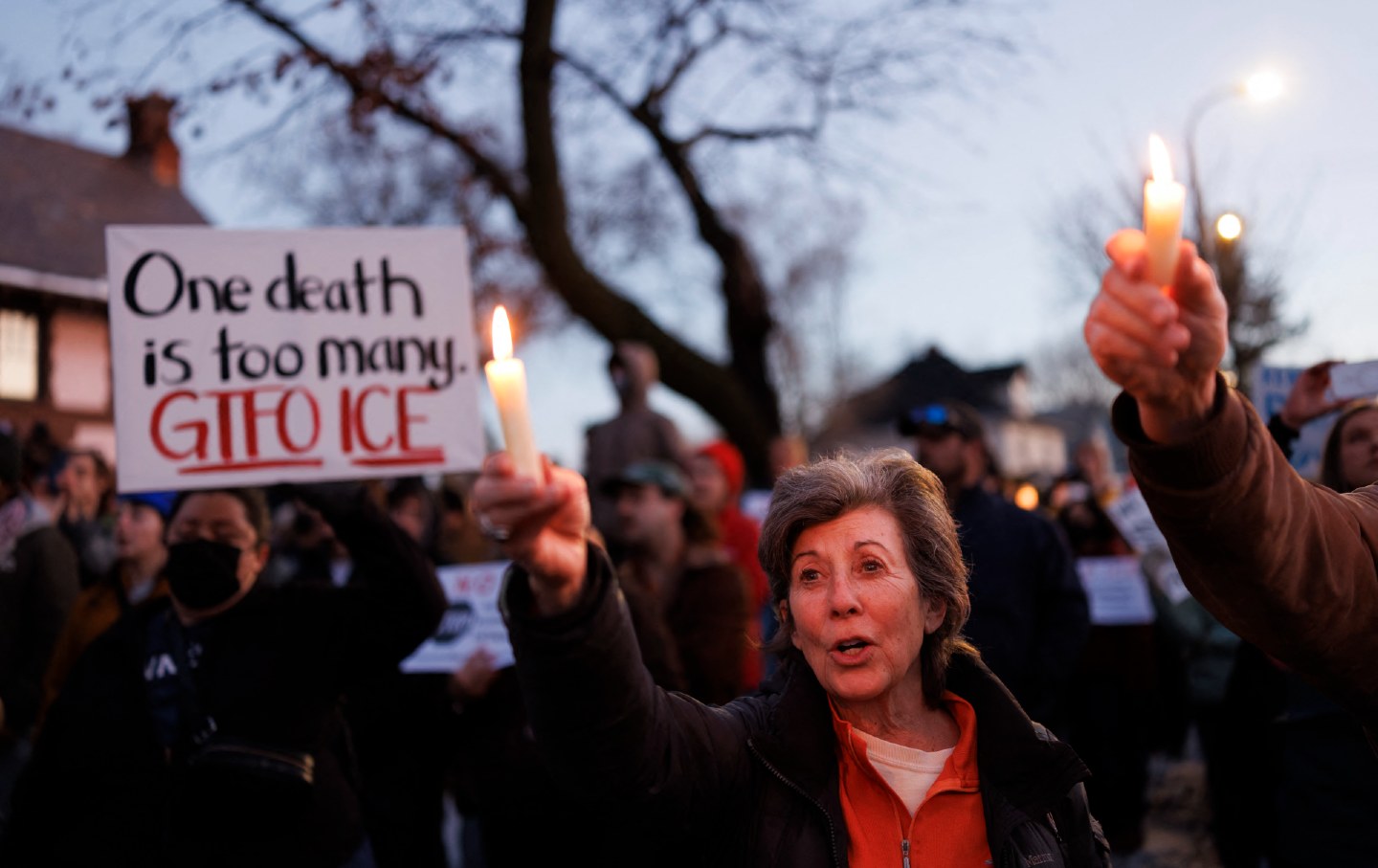Tesla’s Toxic Culture Has Spread to Its New Plant in Austin
Allegations of sexual harassment, racial discrimination, and dangerous conditions are now surfacing at another Tesla factory.

Tesla’s “gigafactory” in Austin, Texas. The plant was opened in 2022.
(Jordan Vonderhaar / Bloomberg via Getty Images)
JoAn Rogers started working at Tesla’s Gigafactory plant in Austin, Texas, two years ago. “It sounded interesting. It was something different,” the 59-year-old said, and Tesla paid her $18.50 an hour to start out, which Rogers felt was decent pay. Rogers commuted an hour by car each way from her house to the plant, but she still arrived on time. She worked hard, getting good evaluations. “I gave those people 100 percent of me,” she said.
At first, she liked the job. But this past March, her area in a part of the plant called the general store, where workers received package deliveries, got a new, male supervisor. Soon Rogers noticed that any time he was near her—whether walking toward her or standing next to her—he touched and adjusted his penis in her sightline. It happened daily.
Rogers had never experienced sexual harassment from a coworker or supervisor, not even when she worked in a prison. So she asked her lead—a staff member who oversaw her team—to say something so that the supervisor would stop. As far as she could tell, the lead didn’t address the issue with the supervisor. Instead, she started getting threatened with write-ups for things that weren’t her fault. So she escalated the situation, first up the chain of command and then to human resources. But human resources “sent me right back around to the same people giving me problems,” she said. “They direct you to go back to your abuser. They won’t fix anything.” People in charge of her team took her aside to tell her that it was only going to hurt her if she talked to anyone other than them about what was happening.
Related Article
Two other women complained about the same behavior, and still, nothing was done, she said. Then the man sexually harassing her started to write her up for “everything that I did,” she said. “He just made life miserable.” Tesla policy, she and other workers have told The Nation, is that someone with a write-up on their file can’t be promoted or receive a raise or bonus, which prevented her from moving somewhere else in the plant. “He wrote me up so I could not leave the department,” she said. “It was a nightmare.”
Tesla is on the cutting edge of the green economy, by far the top maker of American electric vehicles. But despite its being such an advanced company, its culture appears to be stuck in a different century. One reason may be that it gets set at the top by a man with a long history of questionable behavior. CEO Elon Musk himself has been accused of sexual harassment. He named his cars the Models S, 3, X, and Y to spell “sexy,” which he then emblazoned on the seat of red satin shorts. In September, after pop artist Taylor Swift endorsed Democratic candidate Kamala Harris for president, he targeted her on his social media platform X with threats of sexual assault.
That attitude toward disobeying laws and allegedly engaging in harassment seems to have seeped onto his factory floors. The Nation reported in April that, according to a review of more than 50 legal documents, government records at the Occupational Safety and Health Administration (OSHA), and interviews with workers and their lawyers, Tesla plants in Fremont, California, and Sparks, Nevada, are hotbeds of sexual harassment, racial discrimination, and unsafe working conditions.
Now The Nation can report for the first time that similar allegations of sexual harassment, racial discrimination, and dangerous conditions have cropped up in its newer factory in Austin, Texas. Rather than ameliorating these problems in its workplace culture, Tesla has allowed them to spread to yet another location. Tesla did not respond to a request for comment.
Brian Simpson was drawn to Tesla because of its focus on green energy. He had previous experience in the automotive sector, having held jobs at Chrysler and Toyota, and liked the work; he never had problems with harassment or discrimination at either company. He started working at the Tesla Austin plant in October 2023.
But soon he was hearing about horrific sexual harassment. A woman who was just hired asked a male coworker where the restroom was and after he showed it to her, he told her, “I’m going to rape you now.” She screamed and ran away. She complained to human resources, but Simpson said the woman, who became a friend of his, was told to keep working with the man who had threatened her. Simpson, who said he knows “what’s right and what’s wrong,” felt compelled to complain himself, even if it meant risking his job. But nothing happened.
Then he witnessed harassment firsthand: A manager started talking about his genitals with a female coworker. So he and the coworker went together to complain to human resources. Two days later, Simpson said, she was fired. For his part, he received a write-up for having “an inappropriate conversation,” according to a copy shared with The Nation. “That’s retaliation,” he said. He has since filed a complaint with the Equal Employment Opportunity Commission, which he also shared with The Nation.
“You try to comply with policies and make sure your environment is good and safe, and then you get the pushback,” he said. “It’s very stressful and I feel isolated.”
Simpson was so disturbed by having his complaints rebuffed that he struggled to sleep. No longer able to stand the environment, Simpson told the company he was going on leave for 30 days starting in mid-August. In September, he extended his leave by another month. “It’s a circus up there,” he said.
What Simpson and Rogers experienced is echoed in 10 legal complaints alleging sexual harassment experienced in Tesla’s Fremont and Sparks plants, previously reviewed by The Nation. Women said they were subjected to inappropriate comments and unwanted touching and that their complaints went unheard and uninvestigated.
The Nation also examined over 40 legal complaints alleging rampant racial discrimination in Tesla’s Fremont and Sparks plants stemming back as far as November 2014. Employees reported hearing racist language, including the N-word, on a nearly daily basis, and seeing racist graffiti, including swastikas and nooses, in public parts of the plant. The Fremont plant was so egregious that workers referred to it as “the plantation” and “the slave ship.”
Rogers and Simpson both described also witnessing discrimination against Black workers in the Austin plant. Simpson heard White and Hispanic coworkers frequently using the N-word around the factory. He worked in quality control, checking production associates’ work after they installed pieces on the cars. But one of those production associates would “bully” the Black workers, he said, by trying to intimidate them into not writing up any errors they caught on his work. He didn’t do it to any of the white or Hispanic ones. When he complained, he said, his supervisor didn’t do anything, and no one ever investigated.
“You don’t see many Blacks that are supervisors, leads, area managers,” Rogers said, herself a Black woman.
Physical safety is also a major issue at Tesla factories. Previously, The Nation found 80 OSHA violations in Tesla’s manufacturing operations between January 2019 and February 2024; the company was hit with $525,020 in fines over that period. The problems start even further back: Between 2014 and 2018, California’s OSHA agency fined the company $236,730 for 54 violations, according to a review by Forbes, which “dwarfed” those levied by state inspectors against 10 other large auto manufacturing companies at the time. In 2015, 2016, and 2018, Tesla’s injury rate was significantly higher than the industry average.
Rogers and Simpson attest that worker safety is an issue in Austin, too. Just after Rogers started working at Tesla in 2022, she said, she had to go to a part of the factory that was still being built to get a part. When she went to grab the box with the part in it, something else fell on it, and as it fell it yanked her arm with it, tearing her rotator cuff. “I have been working with this shoulder like this ever since,” she said. But the company is fighting against covering the cost of fixing it, she said, only wanting to cover part of the surgery she needs to fully regain use of it.
Popular
“swipe left below to view more authors”Swipe →“A lot of people have gotten hurt in that plant,” Rogers said; she knows others who have gotten hit by forklifts. It’s “very dangerous.” OSHA has inspected the plant four times since it officially opened in 2022, although none of the inspections include details about the complaints or what the agency found; two inspections are open, while two have been closed with seemingly no fines. Victor Gomez was working as an electrician at the plant in August when he was fatally electrocuted by an electrified panel. His family, including his widow and three children, have brought a lawsuit against the company and the contractors he had been hired by, accusing them of gross negligence and seeking $1 million in damages.
“It’s not a safe environment,” Simpson said. “You really have to watch out.”
Despite the sexual harassment and safety concerns, Rogers was able to hold out at Tesla until June of this year, but then she got a write up from her abuser that blocked a raise she was expecting. When she got the e-mail informing her, she got so upset that she could feel her blood pressure spike and the room started spinning. “I started feeling sick,” she said. When another employee came to talk to her, she lashed out, telling her that if the company kept messing with people they were going to “make somebody go upside the head,” she said. She was accused of making threats and fired that afternoon. She lost her temper, she admits, but denies making a threat to anyone. Her abuser, meanwhile, is still employed.
Tesla may feel that it’s done with Rogers, but the experience is not done with her. After her termination she locked herself in her room and cried. She’s lost weight. She struggles to sleep. Her depression and anxiety have worsened. “I’m so depressed and so miserable that my body hurts,” she said.
She’s been looking for work ever since she was fired, applying for “pretty much everything,” but she hasn’t gotten any responses except for one job that paid just $8 an hour—nothing like what she made at Tesla, which was close to $25 an hour by the time she was fired. She suspects it’s because of her age. She’s surviving on unemployment benefits and help from family. Even if she were to find a new job, she feels like she’s lost the ability to trust a new working environment “because I don’t know what I’m walking into,” she said.
“They have really messed me up. I am really damaged,” she said. “I would not wish it on my worst enemy.”
More from The Nation

Deportation and the Silence That Follows Deportation and the Silence That Follows
When ICE abducted my father without cause, something strange filled his vacancy.

On Cora Weiss (1934-2025) and Peace On Cora Weiss (1934-2025) and Peace
Cora Weiss died in December at age 91. She never stopped campaigning to save the world from nuclear destruction.

The Media’s Coverage of the Venezuelan Coup Has Been Dreadful The Media’s Coverage of the Venezuelan Coup Has Been Dreadful
War may be the health of state, but it’s death to honest journalism.

Dismantling the Meme Logic Behind Renee Good’s ICE Execution Dismantling the Meme Logic Behind Renee Good’s ICE Execution
The Trump administration is once more invoking upside-down alibis of state to conjure the bogus specter of imminent threat.

Minneapolis to ICE: Get the Fuck Out! Minneapolis to ICE: Get the Fuck Out!
An ICE agent shot dead Renee Nicole Good. Residents are ready to fight back.

Prosecute Renee Nicole Good’s Murderer Prosecute Renee Nicole Good’s Murderer
The ICE agent who killed Renee Nicole Good not only can be held accountable for murder—he must be.


